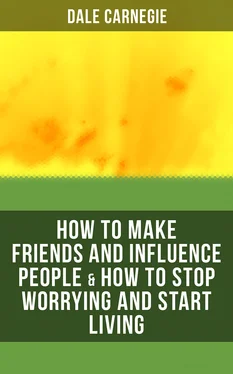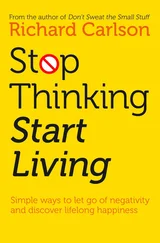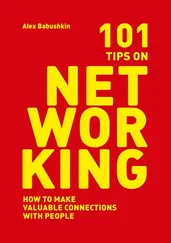People who talk only of themselves think only of themselves. And "those people who think only of themselves," Dr. Nicholas Murray Butler, longtime president of Columbia University, said, "are hopelessly uneducated. They are not educated," said Dr. Butler, "no matter how instructed they may be."
So if you aspire to be a good conversationalist, be an attentive listener. To be interesting, be interested. Ask questions that other persons will enjoy answering. Encourage them to talk about themselves and their accomplishments.
Remember that the people you are talking to are a hundred times more interested in themselves and their wants and problems than they are in you and your problems. A person's toothache means more to that person than a famine in China which kills a million people. A boil on one's neck interests one more than forty earthquakes in Africa. Think of that the next time you start a conversation.
~~~~~~~~~~
Principle 4 - Be a good listener. Encourage others to talk about themselves.
Chapter 5 - How To Interest People
Table of Contents
Everyone who was ever a guest of Theodore Roosevelt was astonished at the range and diversity of his knowledge. Whether his visitor was a cowboy or a Rough Rider, a New York politician or a diplomat, Roosevelt knew what to say. And how was it done? The answer was simple. Whenever Roosevelt expected a visitor, he sat up late the night before, reading up on the subject in which he knew his guest was particularly interested.
For Roosevelt knew, as all leaders know, that the royal road to a person's heart is to talk about the things he or she treasures most.
The genial William Lyon Phelps, essayist and professor of literature at Yale, learned this lesson early in life.
"When I was eight years old and was spending a weekend visiting my Aunt Libby Linsley at her home in Stratford on the Housatonic," he wrote in his essay on Human Nature, "a middle-aged man called one evening, and after a polite skirmish with my aunt, he devoted his attention to me. At that time, I happened to be excited about boats, and the visitor discussed the subject in a way that seemed to me particularly interesting. After he left, I spoke of him with enthusiasm. What a man! My aunt informed me he was a New York lawyer, that he cared nothing whatever about boats - that he took not the slightest interest in the subject. 'But why then did he talk all the time about boats?'
" 'Because he is a gentleman. He saw you were interested in boats, and he talked about the things he knew would interest and please you. He made himself agreeable.' "
And William Lyon Phelps added: "I never forgot my aunt's remark."
As I write this chapter, I have before me a letter from Edward L. Chalif, who was active in Boy Scout work.
"One day I found I needed a favor," wrote Mr. Chalif. "A big Scout jamboree was coming off in Europe, and I wanted the president of one of the largest corporations in America to pay the expenses of one of my boys for the trip.
"Fortunately, just before I went to see this man, I heard that he had drawn a check for a million dollars, and that after it was canceled, he had had it framed.
"So the first thing I did when I entered his office was to ask to see the check. A check for a million dollars! I told him I never knew that anybody had ever written such a check, and that I wanted to tell my boys that I had actually seen a check for a million dollars. He gladly showed it to me; I admired it and asked him to tell me all about how it happened to be drawn."
You notice, don't you, that Mr. Chalif didn't begin by talking about the Boy Scouts, or the jamboree in Europe, or what it was he wanted? He talked in terms of what interested the other man. Here's the result:
"Presently, the man I was interviewing said: 'Oh, by the way, what was it you wanted to see me about?' So I told him.
"To my vast surprise," Mr. Chalif continues, "he not only granted immediately what I asked for, but much more. I had asked him to send only one boy to Europe, but he sent five boys and myself, gave me a letter of credit for a thousand dollars and told us to stay in Europe for seven weeks. He also gave me letters of introduction to his branch presidents, putting them at our service, and he himself met us in Paris and showed us the town.
Since then, he has given jobs to some of the boys whose parents were in want, and he is still active in our group.
"Yet I know if I hadn't found out what he was interested in, and got him warmed up first, I wouldn't have found him one-tenth as easy to approach."
Is this a valuable technique to use in business? Is it? Let's see, Take Henry G. Duvernoy of Duvemoy and Sons, a wholesale baking firm in New York.
Mr. Duvernoy had been trying to sell bread to a certain New York hotel. He had called on the manager every week for four years. He went to the same social affairs the manager attended. He even took rooms in the hotel and lived there in order to get the business. But he failed.
"Then," said Mr. Duvernoy, "after studying human relations, I resolved to change my tactics. I decided to find out what interested this man - what caught his enthusiasm.
"I discovered he belonged to a society of hotel executives called the Hotel Greeters of America. He not only belonged, but his bubbling enthusiasm had made him president of the organization, and president of the International Greeters. No matter where its conventions were held, he would be there.
"So when I saw him the next day, I began talking about the Greeters. What a response I got. What a response! He talked to me for half an hour about the Greeters, his tones vibrant with enthusiasm. I could plainly see that this society was not only his hobby, it was the passion of his life. Before I left his office, he had 'sold' me a membership in his organization.
"In the meantime, I had said nothing about bread. But a few days later, the steward of his hotel phoned me to come over with samples and prices.
" 'I don't know what you did to the old boy,' the steward greeted me, 'but he sure is sold on you!'
"Think of it! I had been drumming at that man for four years - trying to get his business - and I'd still be drumming at him if I hadn't finally taken the trouble to find out what he was interested in, and what he enjoyed talking about."
Edward E. Harriman of Hagerstown, Maryland, chose to live in the beautiful Cumberland Valley of Maryland after he completed his military service. Unfortunately, at that time there were few jobs available in the area. A little research uncovered the fact that a number of companies in the area were either owned or controlled by an unusual business maverick, R. J. Funkhouser, whose rise from poverty to riches intrigued Mr. Harriman. However, he was known for being inaccessible to job seekers. Mr. Harriman wrote:
"I interviewed a number of people and found that his major interest was anchored in his drive for power and money. Since he protected himself from people like me by use of a dedicated and stern secretary, I studied her interests and goals and only then I paid an unannounced visit at her office. She had been Mr. Funkhouser's orbiting satellite for about fifteen years. When I told her I had a proposition for him which might translate itself into financial and political success for him, she became enthused. I also conversed with her about her constructive participation in his success. After this conversation she arranged for me to meet Mr. Funkhouser.
"I entered his huge and impressive office determined not to ask directly for a job. He was seated behind a large carved desk and thundered at me, 'How about it, young man?' I said, 'Mr. Funkhouser, I believe I can make money for you.' He immediately rose and invited me to sit in one of the large upholstered chairs. I enumerated my ideas and the qualifications I had to realize these ideas, as well as how they would contribute to his personal success and that of his businesses.
Читать дальше












